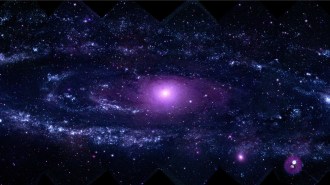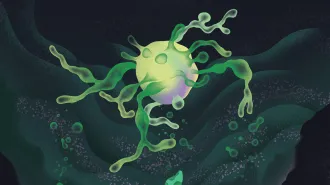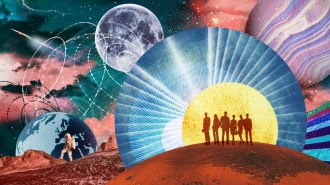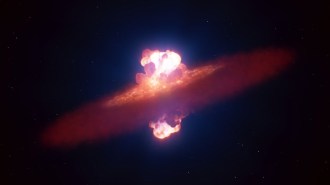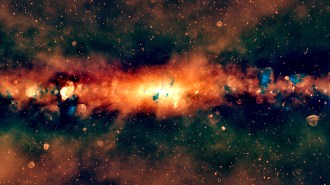In another universe, free-range planets could host life
A tightly packed cosmos could provide habitable zones at galactic fringes
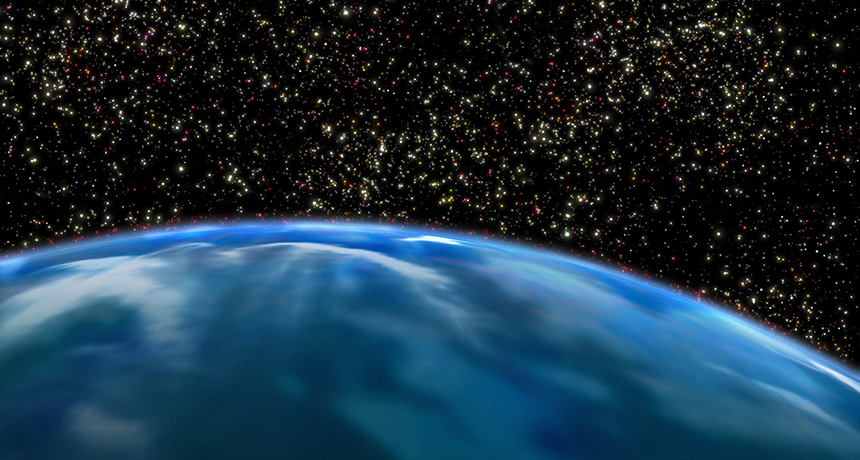
ALTERNATE UNIVERSE A neighborhood of stars packed tightly together (illustrated) might heat interstellar space enough for an orphaned planet wandering nearby to have liquid water on its surface and, therefore, potential for life.
NASA/ESA and G. Bacon/STScI
- More than 2 years ago
Of all possible universes, ours is probably not the only inhabitable one. Universes that start under different circumstances from our own might give rise to a wide range of exotic habitable environments, researchers suggest May 24 online at arXiv.org.
As if our universe weren’t large enough, some researchers speculate that it might be embedded in an even grander network dubbed a multiverse, where each universe operates under its own laws of nature. The most fruitful universe for life as we know it might be one with galaxies where the stars are crammed together too closely for planetary systems to hold together. The outskirts of those same galaxies, however, could host hordes of free-floating worlds (SN: 4/4/15, p. 22) that are kept warm and cozy by the light from millions of neighboring suns, astrophysicist Fred Adams of the University of Michigan and colleagues report.
In our universe, galaxies grew out of pockets of gas that were slightly denser — by just about one part in 100,000 — than the average density of the universe. If those primordial clumps had been denser still, galaxies would have formed more quickly, before the universe had much time to expand. Stars in these galaxies would be closer together because the universe itself was denser at earlier times.
Adams and colleagues ran roughly 1 million computer simulations varying the density of galaxy seeds over an enormous range and calculated what fraction of planets would still be habitable. The universe harboring the largest fraction of habitable locales, they report, is one where the pockets of gas are about 1,000 to 10,000 times as dense as those that populated our universe.
In a close-knit galaxy, the stars would be squished together so tightly that they would routinely steal planets from each other. Most of these hijacked planets would end up as orphans, wandering between the stars. The radiation from so many stars would also bake the now free-range worlds beyond the boiling point of water, making them uninhabitable. Water in its liquid form is what’s essential for life, researchers say. “If too many stars are too close together,” says Adams, “all planets will be like Mercury or hotter.”
The galactic suburbs, however, might be more pleasant. In far-flung neighborhoods, the temperature of interstellar space would be close to that of the space around Earth. Even though many planets would have no star to call home, they would meander through regions that are just the right temperature for liquid water to collect on their surfaces.
“It’s an interesting calculation,” says astrophysicist Martin Rees of the University of Cambridge. In galaxies with densities that high, however, “perhaps a huge black hole would form and you wouldn’t get any stars at all.” If the density of galaxy seeds is more than about 100 times as dense as the ones in our universe, Rees notes, galaxies would form when the entire universe is so dense that light can’t travel freely. The galaxies would trap their own radiation. “It’s not clear that stars could form, much less planets,” he says.
Adams and Rees both agree that more detailed simulations might reveal the range of conditions under which recognizable galaxies can form.
Such counterfactual histories are fun to explore, says Rees. But they also touch on a more fundamental question: Why does the universe behave the way it does? Some researchers, he says, argue that the laws of nature are not unique. Each universe in the multiverse might play by different rules snatched from a cosmic grab bag of physical laws, only some of which might allow life. This type of calculation, he says, is one way of exploring this idea.
“There could be life without planets for all we know,” says Rees, but not without the ability to move energy around and build complex molecules. “All we can say really is that a universe where there’s no complexity would not be any good for life.”

